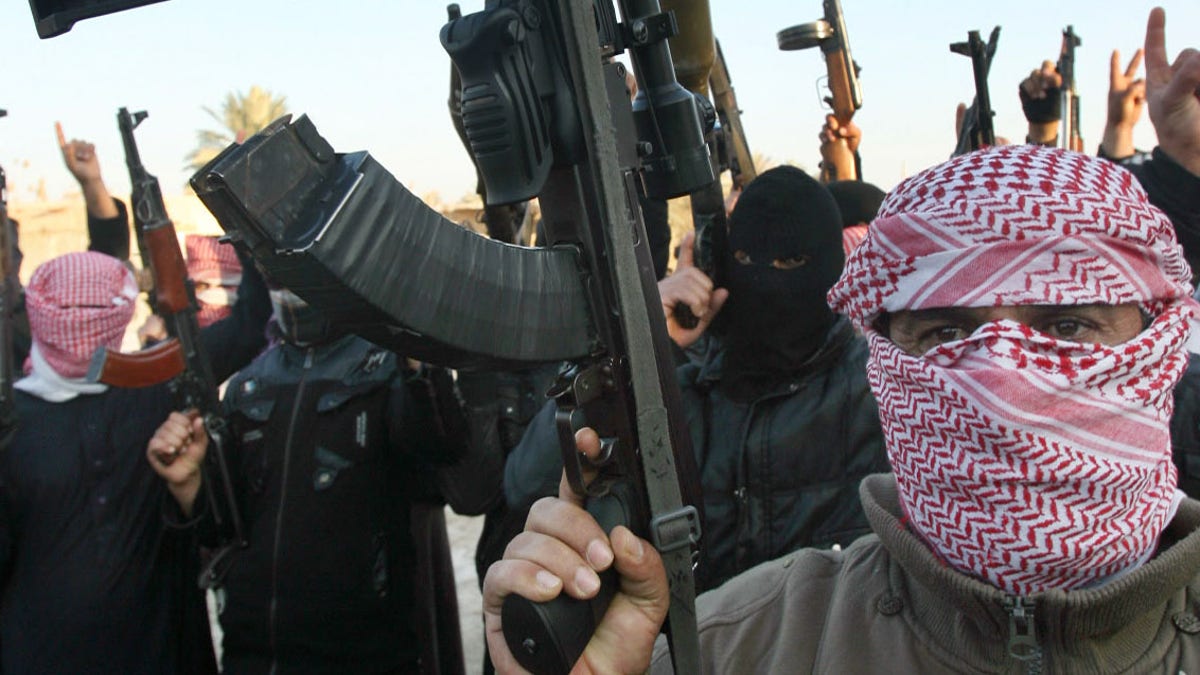
Jan. 7, 2014: Gunmen gather in a street as they chant slogans against Iraq's Shiite-led government and demanding that the Iraqi army not try to enter the city in Fallujah.
WASHINGTON – As Al Qaeda-aligned insurgents make unprecedented post-war gains in Iraq, U.S. military officials and others in the Obama administration are keeping their distance -- despite mounting calls to ratchet up involvement amid fears the country is teetering on the brink of civil war.
Administration officials are now trying to find some middle ground, which so far includes sending additional shipments of Hellfire missiles to Baghdad, as well as surveillance drones. Lawmakers, though, claim it's clear the administration could be doing more.
"There's not a lot we can do, but there's some," Sen. John McCain, R-Ariz., told Fox News, urging the administration to send over high-level advisers to assist Prime Minister Nouri al-Maliki, for starters. A relatively small contingent of military advisers reportedly has been in Iraq since combat forces withdrew.
So far, the proposed fixes range from sending U.S. troops back into Iraq to bulking up Iraq’s military muscle by fast-tracking deliveries of F-16s and Apache attack helicopters to help the Iraqis fight Al Qaeda forces.
The Iraqi government previously has asked Congress and the White House for permission to buy military aircraft. Iraq signed a contract for 18 F-16 warplanes in 2011 and signed another in 2012 for 18 more. None have been delivered yet.
But the administration, and some lawmakers, say they are wary about getting too entrenched in the conflict – and about sending lethal equipment to a region now being overrun by terrorist-tied fighters. President Obama originally campaigned on withdrawing from the Iraq war and did so, entirely, in 2011. The administration says it will help Iraq fight the Al Qaeda-tied militants, but Secretary of State John Kerry made clear this is viewed as a “fight that belongs to the Iraqis.”
A reluctance by the U.S. to fully engage has raised concerns about other countries stepping to the plate and exerting influence.
Frustrated by D.C.’s lethargic response, Baghdad has negotiated the purchase of dozens of Russian Mi-35 and Mi-28NE helicopters. And on Monday, Iran offered to send military aid to the Shiite government in Baghdad.
McCain criticized the Obama administration Tuesday following jarring scenes of Al Qaeda flags flying above the Iraqi cities Fallujah and Ramadi. Fallujah and Ramadi are part of the Anbar province, which was the area where U.S. troops saw the most casualties in the Iraq war.
U.S. forces secured Fallujah in 2004 after one of the war's deadliest battles. Fallujah became notorious among Americans when militants hung the burned bodies of four Americans from a bridge.
“We could have left a residual force behind, it could have been done,” McCain said. “This administration wanted everybody out and they got everybody out. And we predicted that without that residual force – not for fighting but to assist the Iraqi military ... that this whole thing would unravel. It has.”
McCain didn’t mince words when asked about recent comments made by Kerry, McCain’s former congressional colleague and one-time chairman of the Senate Foreign Relations Committee. “It’s really offensive to hear him say that,” McCain told Fox News, referring to him saying this is the Iraqis' fight.
But Gen. Ray Odierno, the Army chief of staff, echoed the secretary of State. He said Tuesday that the U.S. is advising the Iraqi military and that "we're trying to coach them as best we can on these issues."
Odierno did not back sending U.S. troops. "This is certainly not the time to put American troops on the ground," Odierno said during an appearance at the National Press Club. "I think it's time for them to step up and see what they can do."
GOP Rep. Howard "Buck" McKeon of California, chairman of the House Armed Services Committee, has challenged the Obama administration’s stance on Iraq.
“When our allies fight al-Qaeda for us, and the United States sits on the sidelines, not only do our allies notice, but so do our adversaries,” McKeon said in a statement Monday. “I note that Iran has already jumped in with offers of assistance. When terrorism is allowed to flourish abroad, when the specter of insurgency haunts democratic nations, our own security suffers.”
The Iraq War was one of the longest, deadliest and most costly wars in U.S. history.
According to the Brookings Institution’s Iraq Index, there were 189,000 direct war deaths in Iraq -- 4,488 U.S. service personnel were killed and another 32,223 troops were injured. More than 134,000 civilians were killed along with 150 reporters. The U.S. Treasury Department puts the cost of the war through fiscal year 2013 at $1.7 trillion, which roughly comes out to $5,000 spent per second.












































